The Counselor's Bookshelf:
|
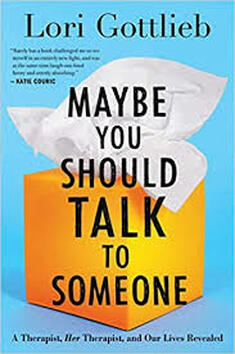 Maybe You Should Talk to Someone, A therapist, her therapist, and our lives revealed is a guided tour through therapy. Lori Gottlieb invites us into her office to observe the gradual, often subtle, shifts clients make as they spend an hour a week on her couch. But she doesn't stop there. She also invites us to join her at her therapist's office where she shares her own process moving from "presenting problem" (boyfriend dumps her) to becoming a wiser, more forgiving and empowered version of herself. This book is an easy read. Gottlieb's clear and engaging writing kept me turning the pages even as I neglected my to-do list and stayed up later than I knew I should. Like a master weaver she integrates her clients' stories with her own so that it becomes clear, chapter by chapter, that we are all united in our humanity. She makes it clear that by taking the time to sit with each other in the raw, and often painful place of authenticity, we also have the potential to reap great rewards in the form of greater intimacy, forgiveness and ultimately peace. Although the book travels through challenging territory, addressing themes of death, traumatic loss, abandonment and abuse, the overall message is hopeful and the book ends with a sense of satisfaction that everyone, thanks to therapy, is a little (sometimes a lot) better off than when they started. While this is not always the case in life or in therapy, and she surely intentionally chose case studies to present that would allow her to end on a positive note, I still finished the book with the overall sense that what we do in the therapy office, whether we are the therapist or the client, has the potential to be deeply transformational for everyone involved. Here's an excerpt: This- right here, right now, between you and me- isn't therapy, but a story about therapy: how we heal and where it leads us. Like in those National Geographic Channel shows that capture the embryonic development and birth of rare crocodiles, I want to capture the process in which humans, struggling to evolve, push against their shells until they quietly (but sometimes loudly) and slowly (but sometimes suddenly) crack open...
0 Comments
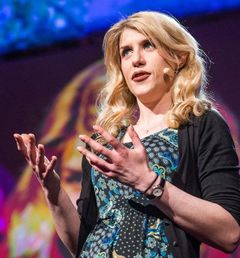 If you read my blog post about SoulCollage®, you won't be surprised to hear that I have been collecting old magazines from family and friends over the past several months. Mostly I just cut out the images I want, but an article in a 2013 issue of Scientific American MIND caught my eye. In Listening to Voices: A student's journey from "normal" to "schizophrenic" and back highlights shortcomings in how our society deals with mental health, Eleanor Longden talks about her experience hearing voices, being diagnosed with schizophrenia, struggling with the treatment offered, and then finding her own way to a kind of mental health that she believes is possible for others experiencing symptoms our medical system often rejects and tries to suppress. By befriending her voices, listening to their (metaphorical, not literal) messages, and integrating their wisdom into what was coming from her "rational" brain, she found healing from trauma and a meaningful connection with her emotions. For those of you familiar with Internal Family Systems, I think you will find her conceptualization of the role of voices in her life to correlate well with the concepts in IFS. The article isn't available for free online, but her TED Talk is. Enjoy. (Thanks to Ted.com for the above photo of Eleanor.) 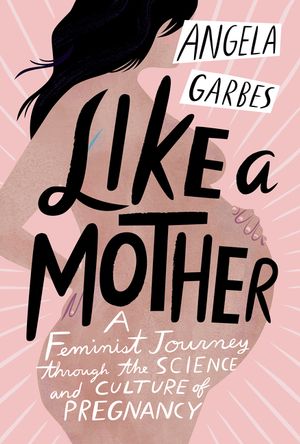 Like a Mother: A feminist journey through the science and culture of pregnancy might not seem like an obvious book for a mental health themed blog. Or, on the other hand, maybe it does? Maybe it makes a lot of sense. We talk about postpartum depression like it's a discrete thing that happens to some people (yes, men get it too) after a new baby is born. What about the idea that pregnancy, with all of its physiological and psychological effects on the mother, and on the entire family unit, actually causes changes and challenges that exist on a spectrum continually evolving over time. Existential and often paradoxical questions about what it means to bring new life into the world, realities of physical changes in the body, a whole range of psychological experiences (often including many mood states, not just depression) as well as cultural expectations all play into each person's unique experience of growing a family. Also, we need to take into account the harsh truth that pregnancy, birth, and life after can be dramatically different for those who have money and access to resource than for those who are poor, live in under-served communities, and, the statistics on this are clear, are not white. Increasingly we are talking about gender non-binary and transgender people having children in a medical system that does not always understand their needs. All of this will have much to bear on the mental health of the entire family. After hearing an interview on Fresh Air with Angela Garbes, I decided to buy the book. For some reason, perhaps the tone of the interview, I thought it would be a light and intellectually stimulating read. In the end I actually found reading this book to be both inspiring and fascinating, and also hard. Everything she covers from the dramatic, and sometimes long lasting, physical changes to the mother's body, to the scientific community's inattention and relative lack of funding for this critical aspect of women's health, is eye-opening and intense. She doesn't sugar coat anything, and thank goodness, because what we are left with is a deeply honest look at what creating new life really means. So much of mental health work is about giving people a space to be witnessed and held while sharing the good, the bad, and the ugly of human life. It is resources like this book that help us feel less alone when things get weird (or slimy, oozy, sticky and stinky). The following excerpt is a taste of Garber's writing. It shows how fairly simple and straightforward research helps us identify small interventions that can make huge differences in the lives of new mothers. If you like what you read, give the whole book a go. It will open your eyes, soften your heart, and hopefully help you, and your loved ones, feel less alone in the gritty, visceral, emotional and very human task of giving birth. In the early 1980s, after fifteen years of working in labor and childbirth, [Penny] Simkin, a physical therapist by training, was considering a career shift.  One day, as I was innocently browsing the internet for something I can't remember now, Jenny Lawson's blog popped up. I knew right away that I had come across something special. She's bold and at times crass. She is completely unafraid of offending you or of grossing you out. She's also incredibly funny and deeply honest about life in this crazy, hard and inspiring world we live in. If you want to read her blog, The Bloggess, click HERE. I ordered her memoir, Furiously Happy, to give her irreverent sense of humor a try, and I loved it. She writes about silly things, and serious things in the same breath. She's honest about her crippling experiences with depression and anxiety, and she is honest about the time she inadvertently crashed a funeral. She merges levity with depth in ways that will make you laugh and cry and feel less alone in your own wild and woolly life. Here's some advance praise for the book: Here's an excerpt:
Dear reader, Right now you're holding this book in your hands and wondering if it's worth reading. It's probably not, but there's a $25 bill hidden in the binding so you should just buy it quickly before the clerk notices. You are welcome. Furiously Happy is the name of this book. It's also a little something that saved my life. My grandmother used to say, "Into everyone's life a little rain must fall- rain, assholes, and assorted bullshit." I'm paraphrasing. But she was right. We all get our share of tragedy or insanity or drama, but what we do with that horror is what makes all the difference. 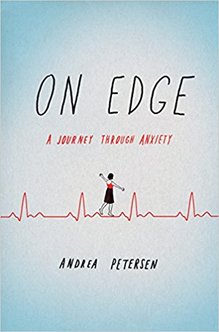 I've been thinking a lot lately about sharing. Not the kind of sharing we teach our children when they cling to their toys. I mean sharing less tangible, but equally substantial, pieces of ourselves. I'm talking about sharing our thoughts, personal stories, histories, and identities. I listen to a lot of podcasts (The Moth, Death, Sex and Money, Modern Love to name a few) where people share their personal stories with large audiences. I listen to so many of these stories that it seems completely normal that someone would want to express themselves in this way. Then I find myself in a position to share something personal about myself and I get scared. Sometimes really scared. Why? Because sharing our histories, our viewpoints and our values is a deeply vulnerable thing to do. We are social creatures and we share without knowing how our most personal perspectives will be received. If you think about stage fright, fear of public speaking and any other social anxiety, it doesn't make sense why the brain's fear center would fire when physical safety is almost entirely guaranteed. And yet, we can all relate to the quickening of the heart, the flush of heat to the face and the sweaty palms that go along with taking social risk. Remember the first time you asked someone out on a date?! On Edge: A journey through anxiety by Andrea Petersen is a fantastic merging of personal narrative and journalism. As someone who is fascinated by anxiety (for both personal and professional reasons) I gobbled this book up in a matter of days. As I was reading, I was continually impressed with the author's candor in sharing her personal experience with the world. And I was grateful. It is through sharing our deepest selves that we risk rejection, and also where we find connection. As I read her book I felt resonance with her struggles and her triumphs. In sharing a piece of herself, she has given a world of people companionship in suffering from one of life's most isolating and painful conditions. If you want to feel less alone in your anxiety, and understand it better from a scientific perspective, this book will be a resource and a balm. Here's an excerpt: Fear ambushes me. It is early on the morning of December 5, 1989. At least early for a college student, which is what I am. A sophomore at the University of Michigan in Ann Arbor, a bucolic campus of creaky A-frame houses, earnest politics, fraternity sweatshirts, and dollar pitchers of beer... 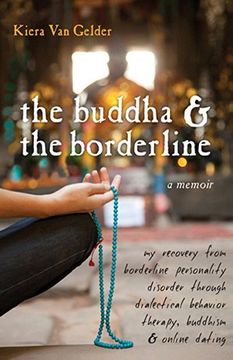 I can't remember how I heard about this book. I think it showed up while searching online for something else. Regardless, I bought it on a whim and put it on my Books-To-Read pile. When I finally picked it up, I was hooked by the first page. In honest, compelling, and remarkably lucid language, Keira Van Gelder tells the story of her evolution from self-proclaimed "mentally ill, suicidal drug addict" to grounded, self-aware, hopeful, connected woman. The book is sometimes fun to read, and sometimes hard. She doesn't pull any punches as she shares candidly about suicide, self-harm, anger, depression, overwhelm, broken relationships and powerlessness. Her experience navigating the mental health system is challenging, and even harrowing, until she finally finds a diagnosis, treatment center, and modality that fit her needs. Most importantly, Keira's story shines a very human light on the possibility for recovery from one of the most feared and stigmatized mental illnesses: borderline personality disorder. Here's an excerpt: In DBT group Simon explains that emotions serve a purpose. "Despite how horrible they feel or how much trouble they seem to cause, they do important things for us: They communicate. They motivate. They self-validate. They give our lives richness and meaning." As the season turns, I try to find meaning in my intense loneliness without concluding that I'm a pathetic loser. My work at the office remains steady, challenging, exhausting, and occasionally satisfying. My walks to work become my mindfulness practice. |
The Counselor's Bookshelf:Sharing the books, articles, podcasts, and other resources I'm drawing from personally, and in my work as a counselor. Archives
October 2019
Categories
All
|
Proudly powered by Weebly
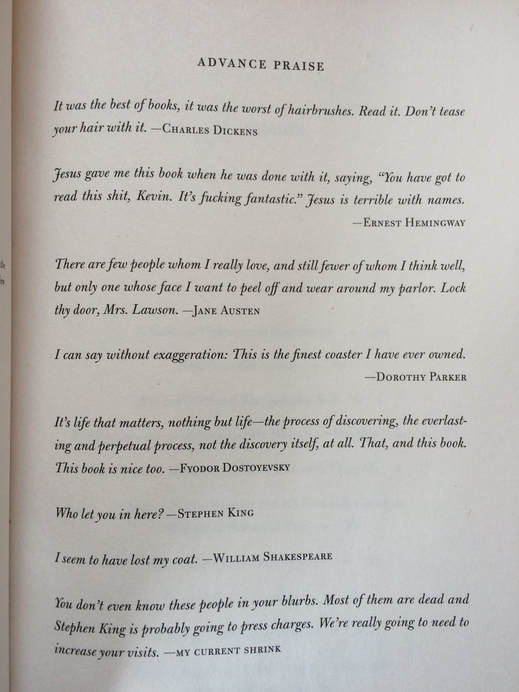
 RSS Feed
RSS Feed